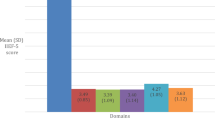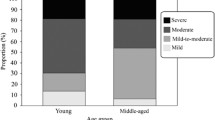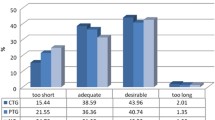Abstract
Purpose: To identify the important issues which have an impact on the quality of life (QoL) of men suffering from erectile dysfunction (ED) and to generate a new ED-specific QoL questionnaire ready to undergo further psychometric testing. Methods: QoL issues relating to ED were generated through in-depth qualitative interviews of 29 patients, literature review and consultation with other healthcare professionals. The issues were formulated into a questionnaire, which was piloted using 40 patients with ED and subsequently refined using well-established principles of questionnaire development. Results: The qualitative interviews revealed numerous psychosocial problems associated with ED, which were operationalised into a 40-item questionnaire. Pilot testing allowed the questionnaire to be reduced to a manageable 15-item final questionnaire while maintaining face and content validity and the potential to discriminate between men with varying degrees of affected QoL. This questionnaire had a Cronbach's α of 0.94. Conclusions: A new ED-specific QoL measure has been developed using appropriate methodology. Qualitative techniques identified a range of psychosocial morbidity in men with ED, leading to a simple but robust instrument with face and content validity. This questionnaire, Erectile Dysfunction – Effect on quality of life (ED-EQoL), has now undergone psychometric testing for validity and reliability.
Similar content being viewed by others
References
Wagner TH, Patrick DL, McKenna SP, Froese PS. Cross-cultural development of a quality of life measure for men with erection difficulties. Qual Life Res 1996; 5: 443.
Feldman HA, Goldstein I, Hatzichristou DG, et al. Impotence and its medical and psychosocial correlates: Results of the Massachusetts Male Aging Study. J Urol 1994; 151(1): 54-61.
Boggs WM. Therapy Markets and Emerging Technologies: Prospects for Erectile Dysfunction Therapies. Decis Resour Inc 2000.
Fugl-Meyer AR, Lodnert G, Bränholm IB, Fugl-Meyer KS. On life satisfaction in male erectile dysfunction. Int J Impotence Res 1997; 9: 141.
Krane RJ, Goldstein I, Saenz de Tejada I. Impotence. N Engl J Med 1989; 321: 1648.
NIH Consensus Development Panel on Impotence: Impotence. JAMA 1993; 270: 83.
Gheorghiu S, Godschalk M, Gentili A, Mulligan T. Quality of life in patients using self-administered intracavernous injections of prostaglandin E1 for erectile dysfunction. J Urol 1996; 156: 80.
Rosen RC, Riley A, Wagner G, Osterloh IH, Kirkpatrick J, Mishra A. The International Index of Erectile Function (IIEF): A multidimensional scale for assessment of erectile dysfunction. Urology 1997; 49: 822.
Parkerson GR, Willke RJ, Hays RD. An international comparison of the reliability and responsiveness of the Duke Health Profile for measuring health-related quality of life of patients treated with alprostadil for erectile dysfunction. Med Care 1999; 37: 56.
Willke RJ, Glick HA, McCarron TJ, Erder, MH, Althof SE, Linet OI. Quality of life effects of alprostadil therapy for erectile dysfunction. J Urol 157: 2124.
MacDonagh R. Quality of life and its assessment in urology. Br J Urol 1996; 78: 485.
Glaser BG, Strauss A. The Discovery of Grounded Theory: Strategies for Qualitative Research. Chicago: Aldine, 1967.
Strauss A, Corbin J. Basics of Qualitative Research. California: Sage, 1990.
Sandelowski M. Rigor or rigor mortis: The problem of rigor in qualitative research revisited. Adv Nurs Sci 1993; 16:2, 1.
Guba EG, Lincoln YS. Epistemological and methodological bases of naturalistic enquiry. Educat Commun Technol J 1982; 30:4, 233.
Hammersley M, Atkinson P. Ethnography: Principles in Practice. London: Tavistock, 1983.
Miles MB, Huberman M. Qualitative Data Analysis. Beverley Hills: Sage, 1984.
Streiner DL, Norman GR. Health Measurement Scales: A Practical Guide to Their Development and Use. OUP: Oxford, 1989.
Cronbach LJ. Coefficient alpha and the internal structure of tests. Psychometrika 1951; 16: 297.
Ferguson GA. On the theory of test development. Psychometrika 1949; 14: 61.
MacDonagh R, Ewings P, Porter T. The effect of erectile dysfunction on quality of life: psychometric testing of a new quality of life measure for patients with erectile dysfunction. J Urol 2002; 167(1): 212-217.
Author information
Authors and Affiliations
Rights and permissions
About this article
Cite this article
MacDonagh, R., Porter, T., Pontin, D. et al. The ED-EQoL: The development of a new quality of life measure for patients with erectile dysfunction. Qual Life Res 13, 361–368 (2004). https://doi.org/10.1023/B:QURE.0000018471.04066.4c
Issue Date:
DOI: https://doi.org/10.1023/B:QURE.0000018471.04066.4c




